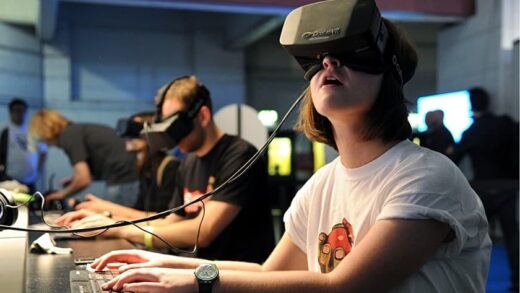Virtual reality is stepping strong into the world of video games, generating great opportunities both for users and for large companies that are committed to digital transformation.
Until recently it was an experiment with an eye to the future, but now has become a way to play with increasing weight in the digital libraries of millions of players around the world.
Virtual Reality applications are evolving rapidly. From education to healthcare, but by far the most popular application of VR is entertainment.
As virtual reality games continue to grow, a healthy ecosystem is being built for both developers and players, in the long term. In video games is the seed of what will one day become the metaverse, and it is exciting to be part of this construction process.
Virtual Reality in the video game industry
Virtual reality (VR) is a simulated experience that can be similar or completely different from the real world, and that aims to create a multisensory experience for the user. This technology enables players to get a truly immersive, first-person perspective of the game’s action. Participants experience and influence the game environment through a variety of virtual reality gaming devices and accessories.
The industry as a whole is growing at a rapid rate, and the size of the global virtual reality gaming market is projected to grow from less than $ 5 billion in 2021 to more than $ 12 billion by 2024.
Both the business and consumer segments, including the growing development of the virtual reality gaming industry, are expected to benefit from the anticipated growth.
Virtual reality ecosystem
Currently, standard virtual reality systems use virtual reality headsets or multiprojection environments to generate realistic sensations that simulate the physical presence of the user in a virtual environment.
Oculus Rift, HTC Vive, Valve Index or Samsung HMD are just some of the most advanced equipment on the market to experience this technology that has more and more followers.
Virtual reality offers a fully immersive high definition experience that we have never experienced before.
Adoption of virtual reality
Analysts suggest that improvements in virtual reality hardware, such as the introduction of smaller, more modern devices, will support greater adoption of virtual reality by consumers and across industries.
As a result, the economic benefits of virtual reality are expected to be felt around the world, growing considerably as use cases expand and develop.
Early adoption of technology, experimenting with it, and combining it with existing social patterns and phenomena opens up new opportunities in the entertainment industry.
How do we build a world of digital opportunities?
Understanding this technology and its applications is half of the equation, the other is understanding how to power its use cases.
At Cualit we rely on the new and exciting capabilities that arise from the fusion of the tangible and virtual worlds, to provide valuable solutions to almost all industries, especially video games: a milestone that places us among the top 3 agencies for virtual reality games in Latin America.














